- Teaching and Research Logopedics M.Sc.
- Spain, Donostia-San Sebastián
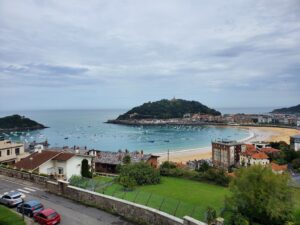
© Anne-Kathrin Mahlke
- Basque Center on Brain, Cognition and Language (BCBL)
- 09/2023 – 12/2023
- Application / Finding an Internship
Finding the group and supervisor, and even deciding to do an Erasmus+ research stay abroad was a total stroke of luck. I knew that I wanted to look into young children’s language development in my master’s research project and had been searching for suitable research groups within Germany. By chance, another student who had just returned from her own Erasmus+ research stay at the BCBL in San Sebastián in Spain reported about it in a colloquium – and talked about doing exactly the kind of research I knew I wanted to do. Then it was just a question of being brave enough to send an e-mail to the leader of the group she had worked with, asking about the possibilities for a research internship. After sending my first e-mail, I did not hear anything back for over two weeks – and almost gave up on the whole idea. Only thanks to my partner’s relentless encouragement did I bring up the courage to send a reminder – and to this day I am deeply greatful for his engouragement! I heard back from the supervisor almost immediately, and she was very open to me visiting her group!
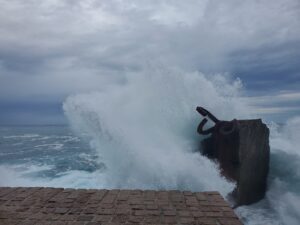
© Anne-Kathrin Mahlke
After agreeing on a time frame for my stay, extensive preparations began: we started discussing possible topics for my research project, which mostly meant a lot of paper reading on my side. I also asked one of my professors in Germany for his co-supervision, as this is required in my program. In parallel, I started the application process for the Erasmus+ support. After reading all the information on the application, this took time, but was fairly easy. I was lucky that all people involved – my supervisor in Spain, my supervisor in Germany, and the adminstrators involved – were extermely helpful and available for any questions or requirements I had.
- Accomodation & Living expenses
Although it is a smaller city, unfortunately, San Sebastián is one of the most expensive places to live in Spain, and finding accomodation is not easy. Single rooms in shared appartments can easily cost 400-600 € per month. Fortunately, my supervisor was able to connect me with a Guest House for visiting researchers, in which I not only found accomodation quickly, but which would also become the place where I found some of my closest friends during my stay. The high housing prices meant that basically my whole Erasmus+ funding went towards rent during my stay. Luckily, I had some additional funds saved, and the cost of food and everyday life in Spain is quite low.
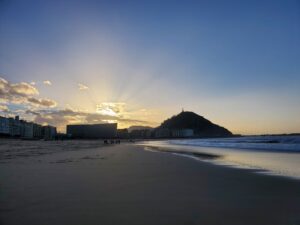
© Anne-Kathrin Mahlke
- Everyday life / The internship
As I had done a lot of theoretical preparation for my research project already in Germany, I was able to jump straight into work at the institute. Still, there was a lot to learn. I was assigned days on which I was required to help in the BabyLab, and in the first few weeks spent any free minute there in order to quickly get to know the different experiments and methodologies. Even though most families visiting the BabyLab spoke Spanish and/or Basque, and I am not fluent in either of these languages, I could quickly pick up many of the more technical tasks, or entertain the babies, for which language is not too necessary. Since I was conducting an EEG study, I also started learning the necessary data analysis methods. Between regular meetings, presentations, reading, writing, programming, and lab duties, I quickly fell into a busy, but extremely productive routine.
The group and my supervisor were great at welcoming me and including me in the proceedings at the institute. Since the BCBL is a small, close-knit community, many people came up to me, introduced themselves, and asked about my plans for the stay.
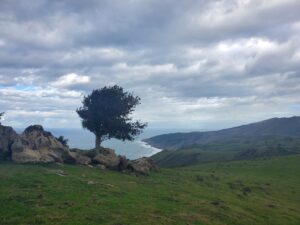
© Anne-Kathrin Mahlke
Interacting with so many people who are all interested in the same topics I am interested in, and hearing about all their amazing research was probably one of the greatest experiences during my stay at the BCBL.
My supervisor made sure to give me a lot of freedom and simulteaneously providing enough guidance for me to successfully progress through my project. I also received a lot of support from other members of the group, and have formed some great friendships. Since the group is rather new and mostly made up of PhD students and young postdocs, we were all in similar situations and could help each other, which created a great atmosphere. I am very much looking forward to watching all of them grow throughout their academic career and to meeting them at many conferences to come!
- Free time / tips
Although still relatively unknown, the Basque Country is an amazingly beautiful place with a very high quality of
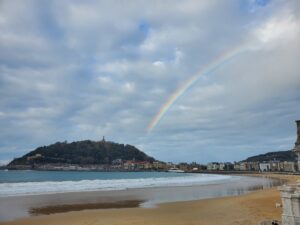
© Anne-Kathrin Mahlke
life. This is especially true for San Sebastián. Donostia (as it is called in the Basque language) has one of the highest densities of Michelin stars per inhabitant in the world, and it is hard to find a bad restaurant in the city. The culinary speciality are Pintxos, small bites of food that are usually taken with a glass of local wine. San Sebastián also provides a lively cultural scene, with exhibitions, concerts, sports events, and much more. Some of the highlights during my time there were a rowing regatta which basically became a big festival, and the San Sebastián Film Festival. A big international community provides cultural diversity, while at the same time the Basque culture and language are ubiquitous and greatly influence everyday life. Furthermore, San Sebastián has great public infratstructure with a well working and cheap public transport network and quite well connected bike lanes (even though the mountains make these a tiny bit less attractive).
For me, probably one of the most enjoyable aspects of San Sebastián and the Basque Country are its landscapes. With the atlantic ocean on one side and impressive mountains on the other side, the area provides endless opportunities for outdoor activities. Hiking, surfing, climbing, swimming – even though I only managed to do a fraction of the things I had planned to do, I enjoyed every single outing.
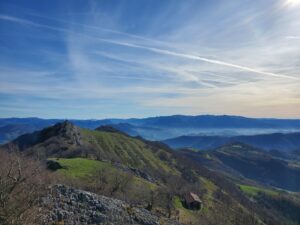
© Anne-Kathrin Mahlke
Even just hearing the waves and seeing the mountains on the horizon on my way to work made every day life a little bit better. One of my favourite things to do when stressed was to walk down from my appartment to the coast and watch the waves for a little while. Now, back to living in Cologne, I deeply miss the sea, the mountains, and the fresh air they bring.
- Conclusion
All in all, my stay in San Sebastián and at the BCBL was an extremely valuable experience. Even though it came about almost by chance, I now see it as one of the most important times during my studies, with regards to both my personal and my academic development, to the friendships and connections I have made, and to the impact it has had on my plans for my future. It is a place I will definitely return to – for holidays or even for a longer stay – and I hope to keep the connections I have made alive. I am also very happy to have helped create and uphold the connection between the BCBL and the RWTH Aachen – as I am writing this, the next student is planning her stay there – and I hope that this will become a long standing and fruitful tradition.


Leave a Reply